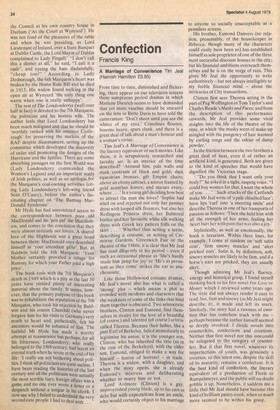Confection
Francis King
A Marriage of Convenience Tim Jeat (Hamish Hamilton £5.95) From time to time, diminished and flickering, there appear on our television screens those sumptuous period dramas in which Marlene Dietrich seems to have demanded that yet more vaseline should be smeared on the lens or Bette Davis to have told the cameraman: 'Don't shoot until you see the whites of my eyes.' Crinolines flounce, bosoms heave, spurs clank, and there is a great deal of talk about a man's honour and a woman's virtue.
Tim Jeal's A Marriage of Convenience is the literary equivalent of such movies. Like them, it is scrupulously researched and lavishly set. Is an interior of the time described? 'Around him, pale walls and stark contrasts of black and gold; dark equestrian bronzes, gilt Empire chairs; above an ebony cabinet, a mirror framed by gold acanthus leaves; and statues everywhere. ' Is a young girl deciding how best to attract the man she loves? 'Sophie had tried on and rejected not only her pannier dress with looped silk flounces, but also her Redingote Princess dress, her Balmoral bodice and her favourite white silk walking dress with Greek key pattern frills on the skirt Whether thus setting a scene, describing a costume, or writing of Cremorne Gardens, Greenwich Fair or the theatre of the 1860s, it is clear that Mr Jeal has read diligently in his period — even if such an occasional phrase as 'She's hardly made him jump for joy' or 'He's as persistent as they come' strikes the ear as anachronistic.
Like those Hollywood costume dramas, Mr Jeal's novel also has what is called a 'strong' plot — which means a plot so crowded with incidents and characters that the weakness of some of the links that bind them together is obscured. Two aristocratic brothers, Clinton and Esmond, find themselves in rivalry for the love of a beautiful (of course) and talented (of course) actress called Theresa. Because their father, like a past Earl of Berkeley, failed immediately to legitimise his union, it is the younger son, Clinton, who has inherited the title (as in the case of the Berkeleys), with the older son, Esmond, obliged to make a way for himself — horror of horrors! — in trade. Theresa is a widow, with a daughter, and when the story opens, she is already ESMOIrld'S mistress and deliberating whether to marry him or not, Lord Ardmore (Clinton) is a gay, impoverished young blade, up to his ears in debt but with expectations from an uncle, who would certainly object to his marriage to anyone so socially unacceptable as a penniless actress. His brother, Esmond Danvers (no relation, presumably. of the housekeeper in Rebecca, though many of the characters could easily have been so) has established himself as sole proprietor of one of the three most successful discount houses in the city; but his financial ambitions overreach themselves and he is on the verge of ruin. This gives Mr Jeal the opportunity to write authoritively — but not always intelligibly to my feeble financial mind — about the intricacies of City transactions.
Clinton first sees Theresa acting in the part of Peg Woffington in Tom Taylor's and Charles Reade's Masks and Faces; and from the description of this performance onwards, Mr Jeal provides some vivid insights into the life of the theatre of the time, in which 'the musky scent of make-up mingled with the pungency of hair warmed by curling tongs and the odour of damp powder.'
In the friction between the two brothers a great deal of heat, even if of rather an artificial kind, is generated. Both are given to the kind of speeches that would have dignified the Victorian stage.
'"Do you think that I want only your body?" he asked in a tight, rasping voice. "I could buy women for that. I want the whole of you . . Such attacks of the Cartlands make Mr Jeal write of 'a pale chiselled face'; have lips 'curl' into 'a sneering smile' and describe Theresa in one of her transports of passion as follows: 'Then she held him with all the strength of her arms, feeling her heart hurt her with pain that was also a joy.'
Stylistically, as well as emotionally, the book is luxuriant. Within three lines, for example, I come at random on 'soft satin coat', 'firm sinewy muscles' and 'alert pricked ears'. Satin is, by definition, soft, sinewy muscles are likely to be firm, and if a horse's ears are pricked, they are usually alert.
Though admiring Mr Jeal's fluency, energy and historical grasp, I found mySelf thinking back to his first novel For Love or Money which I reviewed some years ago. The style did not always render it easy to read; but, firm and sinewy (as Mr Jeal might describe it), it made and left its mark. Similarly, t he story had a rawness of emotion that has somehow stuck with me — perhaps because the author himself seemed so deeply involved. 1 divide novels into counterfeits, confections and creations. Neither that first novel nor this oneicould be relegated to the category of counterfeit. But if that first novel, whatever its imperfections of youth, was genuinely a creation, so this latest one, despite the skill of its maturity, remains a confection. It is the best kind of confection, the literary equivalent of a production of Floris or Rum pel meyer, and the public will no doubt gobble it up. Nonetheless, it saddens me a little that Mr Jeal should have become this kind of brilliant pastry-cook, when so much more seemed to be within his grasp.


































 Previous page
Previous page